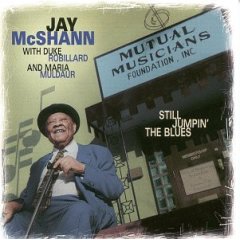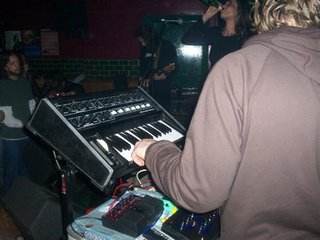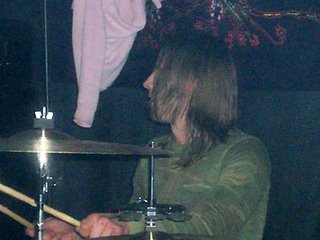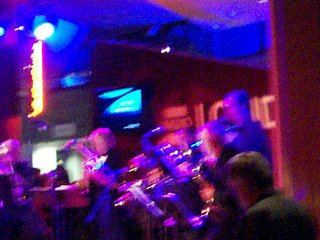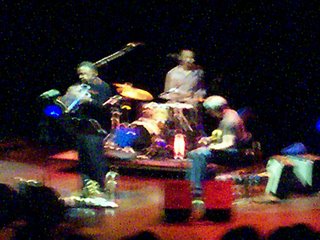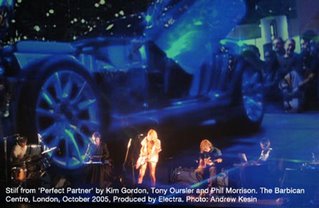Back to the music... last week was an intestinal nightmare which left me totally bolloxed... but I made it to the Club Sporadic gig on Saturday, which, on a freezing cold night, lifted my spirits. Guest band Ego Unit played an intriguing set and we came together and did what we do. Waiting to get the playback to hear whether it was actually as good as it felt at the time...
As my cd drive is buggered and I can't get it fixed until Friday I'm limited to what I can upload for a few days and can't convert any tracks into MP3 either for the same reason – so whatever comes up will be stuff on my hard drive or MP3 player... apparently, tomorrow is
St Cecilia's Day, the patron saint of music... for reasons that I have missed/avoided/whatever, it has been declared that today, the 21st, is
'No Music Day'... so, perverse to the end, here's a stack of jazz and assorted musics... we all celebrate in our own ways and this is mine. Happy listening... (This is one of Bill Drummond's gags, anyway...)
So: let's do 'The Shuffle Twist.' Some greasy back beat blues from Gene Ammons, Brother Jack Mc Duff and Sonny Stitt. Does exactly what you think it will do – but does it so well. Ammons has a bearhug of a tone on tenor... Stitt, always unfairly underrated... Brother Jack testifies...
More Hammond, upping the tempo – the redoubtable Jimmy Smith heading up a session of hard blowers on the old Bird classic 'Au Privave.' Smith bubbles up into the first solo, a couple of his trademark funky riffs in there, but, in the main, more linear work, invoking the shade of the composer. A couple of shattering rolls from Blakey, just to spur him on... Lee Morgan, fleet of line. Lou Donaldson, wanders a bit but heart in the right place. Tina Brooks good on tenor... Kenny Burrell always steady and bluesy...
'Dark Eyes' from a session recorded by three early giants of modern jazz, Gillespie, Getz and Stitt (again). The album title flags it up – 'For Musicians Only.' Defiantly elitist... Where bop started, shutting out those who could not negotiate the changes, tempos and rhythms. 1956 was the year after Charlie Parker died and this marks a high watermark, maybe, a summation of all that had gone before. Classy, high octane blowing... Stan Getz off first, belying his 'cool' image – fiery stuff. Followed by Stitt, equally firing strongly - but Diz pips them all, I think. Easy to forget sometimes how good he really was... rapid-fire lines and the odd vocalised smear from the back end of the trumpet timbral history just to remind you where it all came from. A brief solo from John Lewis to remind us that he was there as well before Diz takes it out over the two weaving saxes.
'Ysabel's Table Dance.' The 'Spanish Tinge' with a vengeance... Mingus's 'spontaneous overflow of powerful feelings from emotions recollected,'(from
here... scroll down...) no doubt, (but probably not in tranquility) stemming from a trip south of the border, this track supposedly evoking a striptease. Starting with Frankie Dunlop's maraccas, according to the discography, female yips and handclaps from Ysabel Morel and a flamenco-like progression, etched out by bowed bass, the track slowly builds into a wild ride. For a smallish band, they make a lot of noise... Moving in sections like much of Mingus's music – one of his solutions to composing in longer forms - doing the postmodern thang before John Zorn? - Shafi Hadi goes to a straighter jazz interlude in relief to the preceding chaos. Things calm down... An ensemble passage leading back into flamenco and the wildness returns before the bass walks it down steady. Tension and release, tension and release. This was recorded in 1957 but shelved for several years. One wonders at the way history may have been changed if it had come out earlier, pre-figuring much of what was to come... Consider: the preceding Diz/Getz/Stitt track was recorded a year earlier – yet this is conceptually a long way from High Bebop... Arriba...
John Coltrane recorded this version of 'Summertime' in 1960 on the first album his epochal quartet made, 'My Favourite Things.' Taken faster than is usual for this tune, a perfect summation of where he was artistically at that moment – the sheets of sound wrapped so tightly that one can now see/hear why he had to explode beyond into new spaces. A perfect snapshot... the tenor playing is immense, overpowering in its grandeur... but I'm a fan. Tyner plays a superb solo, still sure of his ground at this part of the game, followed by Steve Davis – fleet and melodic - and Elvin, soloing over Davis's bass accompaniment before Coltrane returns for another quick blast. A superb track... St Cecilia will dig this...
Late Mingus, 1977: Cumbia and Jazz Fusion, part one... opening on bird-song and flutes over a sparse drum off-beat and chanting... Mingus meets the rain forest? Percussion: latin meets african – the global music thing... until a strong bass vamp appears... instrument call and response over the simple tune, switching textures and sections... finally the band come powering in, odd echoes of Diz and his Afro-Cuban thing? Throaty tenor solo...A third of the way in, the tempo slows, rhapsodic piano from Bob Neloms, swirling across the keyboard, then a waggish trombone heralds an oddly corny bass vamp – muted trumpets and trombones converse, the rhythm building relentlessly like a train, the horns slowing again half-time – another tempo shift – the drums and percussion have it and ride for a while. Orchestra returns – then Mingus sings: 'Who says momma's little baby likes shortning bread... momma's little baby likes... caviar... diamond mines...Freedom!!' You get the idea... Mingus comes up for a solo, as the band tread water - lines that range across the whole range of the bass, a late laying down of markers, sadly... return of band... then Knepper solos, his usual gruff fluency, followed by piano again, this time more single line in the pocket... ensemble, then the bass weaving in and out to a fade...
A superbly wacky track, really...
In the Videodrome...Coltrane in 1963...
Some
Mingus... Ornette dances with your head...
Gene Ammons/Sonny Stitt/Jack McDuff
(Gene Ammons, Sonny Stitt (ts) Brother Jack McDuff (org) Charlie Persip (d)).
Download
Shuffle Twist
BuyJimmy Smith
(Lee Morgan (tp) Lou Donaldson (as) Tina Brooks (ts) Jimmy Smith (org) Kenny Burrell (g) Art Blakey (d)).
Download
Au Privave
BuyDizzy Gillespie/Sonny Stitt/Stan Getz
(Dizzy Gillespie (trumpet); Stan Getz (tenor saxophone); Sonny Stitt (alto saxophone); John Lewis (piano); Herb Ellis (guitar); Ray Brown (bass); Stan Levey (drums)).
Download
Dark EyesBuyJohn Coltrane
(John Coltrane: tenor saxophone; McCoy Tyner: piano; Steve Davis: bass; Elvin Jones: drums).
Download
Summertime
BuyCharles Mingus
(Charles Mingus: bass; Clarence Shaw: trumpet; Shafi Hadi: alto saxophone; Jimmy Knepper: trombone; Bill Triglia: piano: Danny Richmond: drums; Frankie Dunlop: castanets; Ysabel Morel: vocals, handclaps).
Download
Ysabel's Table Dance
BuyCharles Mingus
(Jack Walrath (tp) Jimmy Knepper (tb, btb) Mauricio Smith (fl, picc, ss, as) Paul Jeffrey (ob, ts) Gene Scholtes (basn) Gary Anderson (cbcl, bcl) Ricky Ford (ts) Bob Neloms (p) Charles Mingus (b, South American rhythm inst., vo, arr) Dannie Richmond (d) Candido, Daniel Gonzales, Ray Mantilla, Alfredo Ramirez (cga) Bradley Cunningham, Ricky Ford, Jack Walrath (South American rhythm inst.)
Download
Cumbia and Jazz FusionBuy


